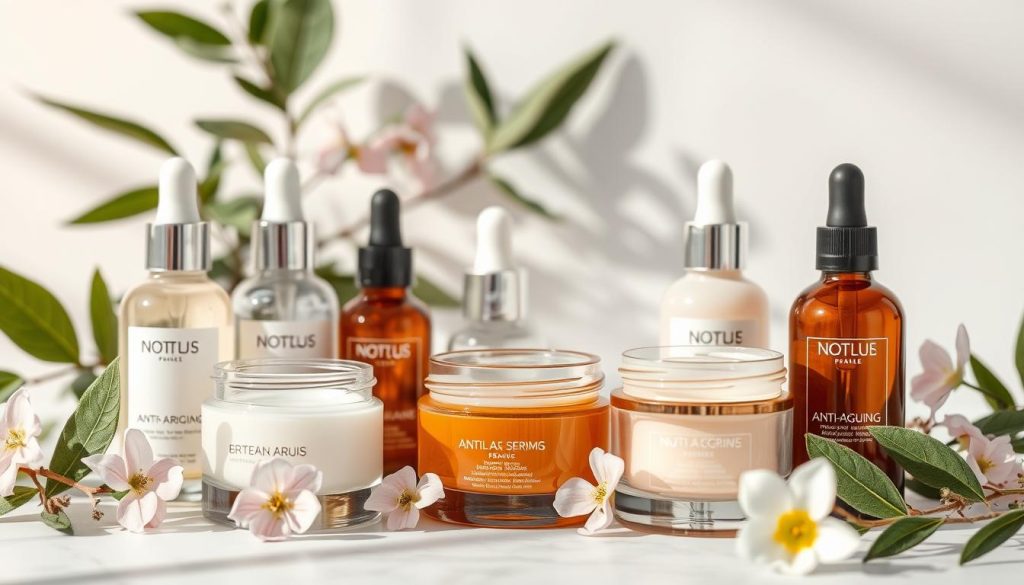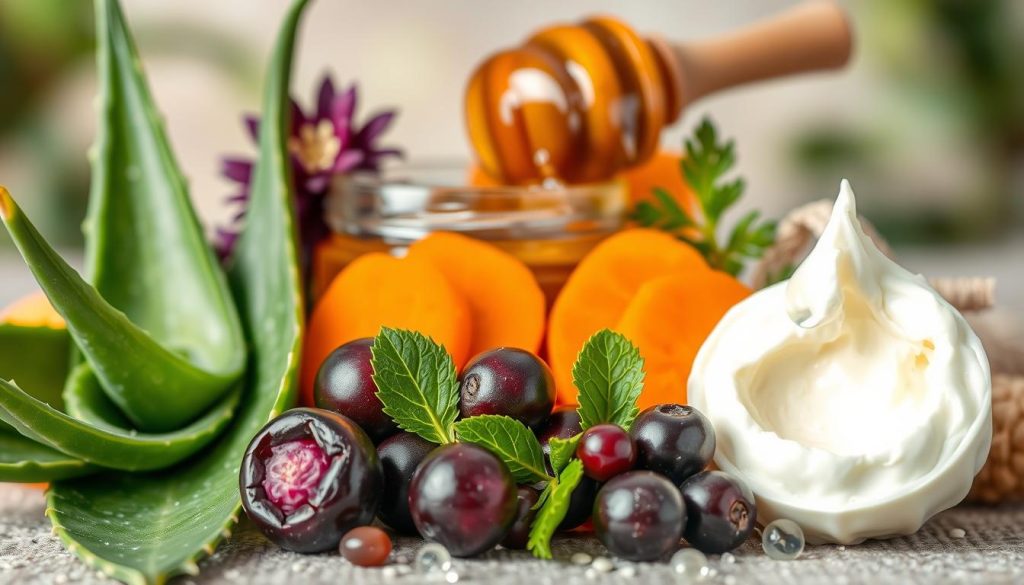When women hit their 40s, their skin starts to show signs of aging. Hormones change, and the skin gets less fresh. This can cause wrinkles, dark spots, and a dull look. But, with the right skincare, women can keep their skin looking young and bright.
This guide shares 10 key tips for anti-aging skincare for women over 40. These tips will help you keep your skin looking great for years to come.

Key Takeaways
- Understand the hormonal and natural aging impacts on skin changes after 40
- Prioritize sun protection to prevent premature aging and sun damage
- Discover the power of retinol and vitamin A derivatives in anti-aging skincare
- Implement effective hydration strategies to combat dryness and dullness
- Identify key anti-aging ingredients to look for in your skincare products
Understanding Skin Changes After 40
When we hit our 40s, our skin changes a lot. This is mainly because of hormonal shifts, especially the drop in estrogen. This hormone change means less collagen and elastin, making our skin thinner and less elastic.
Hormonal Impact on Skin Aging
The drop in estrogen, a big change in the 40s, really affects our skin. Estrogen decline is linked to less collagen production and skin elasticity. This leads to more fine lines and wrinkles.
Common Signs of Mature Skin
As we age, our skin shows signs of getting older. It loses firmness, gets fine lines and wrinkles, and age spots appear. It also gets drier and more fragile because of less oil and slower cell growth.
Natural Aging Process Explained
The skin’s aging is complex. It regenerates slower, leading to less collagen production and skin elasticity. Sun damage and other environmental factors add to the signs of aging, like fine lines and wrinkles.
“As we age, our skin undergoes remarkable changes that can impact its appearance and overall health. Understanding these transformations is the first step in developing an effective anti-aging skincare routine.”
The Critical Role of Sun Protection in Anti-Aging
Sun exposure is a major cause of early skin aging, known as photoaging. UV rays from the sun damage collagen and elastin, which are key for young, smooth skin. This damage can cause wrinkles, sun spots, and increase the risk of skin cancer.
Using broad-spectrum sunscreen with an SPF of at least 30 every day is essential. This type of sunscreen protects against UVA and UVB rays. UVB rays cause sunburns, while UVA rays lead to wrinkles and aging.
Wearing protective clothing and staying in the shade during peak sun hours also helps. Wide-brimmed hats and long-sleeved shirts can shield your skin from harmful UV rays.
| Skin Concern | Contribution of UV Exposure |
|---|---|
| Skin Aging | Approximately 80% of facial aging can be attributed to UV exposure |
| Skin Cancer | UV radiation is responsible for about 80% of skin diseases, including skin cancer |
| Skin Elasticity | Photo-damaged skin from UV exposure leads to loss of skin elasticity, roughness, dryness, and deep wrinkles |
By making sun protection a part of your daily skincare, you can fight early aging. This helps keep your skin looking young and radiant for many years.
“Approximately 80% of skin aging on the face can be attributed to ultraviolet (UV) exposure.”
Essential Anti-Aging Skincare Tips
To get youthful, radiant skin after 40, you need a good anti-aging skincare plan. This plan should include gentle cleansing, regular exfoliation, and enough hydration. It helps fight wrinkles, fine lines, and dark spots.
Morning Routine Components
Begin your day with a gentle cleansing to get rid of dirt and prepare your skin. Then, apply an antioxidant-rich serum to protect against harmful environmental factors. Finally, use a broad-spectrum sunscreen to block UV rays, which cause early aging.
Evening Skincare Steps
Evening is for repair and renewal. Start with a cleansing step to remove the day’s dirt. Next, use a retinol-based product to boost collagen and cell turnover. End with a moisturizing night cream to hydrate and nourish your skin while you sleep.
Weekly Treatment Schedule
- Do a gentle exfoliating treatment, like a chemical peel or masque, once or twice a week. It helps remove dead skin cells and brightens your skin.
- Apply a hydrating, replenishing mask weekly. It helps your skin stay moist and hydrated.
By sticking to this anti-aging skincare routine, you can tackle skin aging signs and keep your skin looking young and vibrant.
Power of Retinol and Vitamin A Derivatives
As we age, our skin’s natural renewal and collagen production slow down. This leads to fine lines, wrinkles, and a dull look. But, retinoids can help fight these signs of aging.
Retinol and other vitamin A derivatives, like retinal and tretinoin, are top choices in skincare. They boost skin cell turnover, collagen stimulation, and reduce fine lines and wrinkles.
Retinol, found in over-the-counter products, needs two steps to become active. This means it loses some power. On the other hand, retinal turns into its active form in just one step, keeping more of its strength.
- Retinol may take 4-6 weeks to show results, while retinal can start to work in a few weeks.
- Retinal might cause skin adjustments like flaking and peeling at first, but the skin will adjust.
- Using retinoids with exfoliating alpha hydroxy acids (AHAs) like glycolic acid can make them work better.
It’s important to protect your skin from the sun when using retinoids because they make skin more sensitive. Pregnant women or those trying to get pregnant should not use topical retinoids because of the risk of too much vitamin A.
Adding retinoids to your skincare can help fight aging signs. You’ll get a younger, brighter look.
Hydration Strategies for Aging Skin
As we age, our skin changes a lot. It loses hyaluronic acid and ceramides, which keep it moist and plump. To fight aging, we need a plan that works from the inside and outside.
Internal Hydration Methods
Drinking enough water is key to healthy skin. Try to drink at least 8 glasses a day. Also, eat foods that help keep you hydrated, like watermelon, cucumber, and citrus fruits.
Drinking water helps prevent wrinkles and keeps your skin’s barrier strong.
External Moisturizing Techniques
Using the right skincare products is also important. Look for products with hyaluronic acid and ceramides. These humectants help your skin hold onto water.
Apply hydrating products and use oils or creams to keep your skin moist for a long time.
Combining internal and external hydration helps fight aging skin. Healthy, moist skin is the base for a good anti-aging routine.
Key Anti-Aging Ingredients to Look For
When fighting aging, it’s important to use nourishing ingredients in your skincare. Look for antioxidants, peptides, niacinamide, vitamin C, and alpha-hydroxy acids (AHAs) in your products. These work together to protect, rejuvenate, and revitalize your skin.
Antioxidants: Vitamins C and E fight off free radicals, which cause early aging. Vitamin C also helps reduce age spots and brighten your skin.
Peptides: These amino acid chains boost collagen, which decreases with age. Using peptide products can make your skin look plumper and smoother, reducing wrinkles.
Niacinamide: Known as vitamin B3, niacinamide does many things. It calms inflammation, brightens your skin, and strengthens your skin’s barrier.

AHAs: Glycolic and lactic acids gently remove dead skin cells. This reveals a brighter, more even skin tone. They also help increase collagen and elastin for a younger look.
Start with low strengths of these ingredients and gradually increase as your skin gets used to them. Talking to a dermatologist can help find the right mix for your skin type and concerns.
The Impact of Diet on Skin Health
Your skin shows how healthy you are, and what you eat matters a lot. Eating foods that support your skin and avoiding those that age it faster can help. This way, you can make your skin look great from the inside.
Skin-Supporting Nutrients
Antioxidants in colorful fruits and veggies, like berries and leafy greens, protect your skin. They fight off damage from the environment that can make you look older sooner. Omega-3 fatty acids in fish, nuts, and seeds keep your skin flexible and reduce swelling. Foods rich in collagen, like bone broth and eggs, help your skin stay firm and young.
Foods to Avoid
- Stay away from processed foods with sugar because they can make your skin age faster. They damage collagen and elastin.
- Too many refined carbohydrates and sugary snacks can make your skin produce more oil. This can cause acne.
- Drinking too much alcohol and eating too many processed foods can make inflammation worse. This can make conditions like eczema and psoriasis worse.
Eating a diet full of antioxidants, healthy fats, and foods that boost collagen is key. It helps your skin look and feel its best.
“Nourishing your skin from the inside out is key to maintaining a youthful, healthy complexion as you age.”
Lifestyle Factors Affecting Skin Aging
Our lifestyle choices greatly affect our skin’s health and look as we age. Managing stress, getting enough sleep, and exercising regularly are key. Avoiding smoking and excessive alcohol consumption also plays a big role.
Too much stress and not enough sleep can speed up skin aging. They mess with hormones and the skin’s repair work. High cortisol levels from stress can cause inflammation and damage to collagen and elastin.
But, regular exercise helps keep the skin healthy. It boosts blood flow, bringing oxygen and nutrients. This supports the skin’s natural renewal, keeping it looking young.
It’s also important to avoid smoking and excessive alcohol consumption. Smoking cuts off blood flow, starving the skin of what it needs. It also harms collagen and elastin. Drinking too much alcohol can dry out the skin and cause inflammation, making aging signs worse.
“Skin covers an estimated 25 m2 area of the body and experiences significant trans-epidermal water loss (TEWL) ranging from 120 to 240 g/m2/day. Maintaining optimal skin health and appearance requires a holistic approach that addresses both intrinsic and extrinsic aging factors.”
By focusing on stress management, quality sleep, regular exercise, and staying away from smoking and excessive alcohol, you can improve your skin’s health. This helps delay aging signs and keeps your skin looking young and radiant.
Professional Treatments and Their Benefits
As we get older, professional skincare treatments can really help. They include chemical peels, microdermabrasion, and laser treatments. You can also use LED light therapy devices or peels at home. These options can greatly improve the look of mature skin.
In-Office Procedures
Skincare professionals offer treatments that can make you look younger. Chemical peels come in different depths and take a few days to weeks to heal. They can make your skin smoother and even out your tone, but might cause some redness or scarring.
Microdermabrasion gently removes dead skin cells. It can treat age spots and dullness. Afterward, your skin might look pink or red, and you might feel some sensitivity to the sun.
Laser therapies and microneedling can also help. They boost collagen and reduce wrinkles. But, you might need several sessions and there’s a small risk of side effects if not done right.
At-Home Professional Grade Options
At-home devices and products can be a great addition to your skincare routine. LED light therapy devices are easy to use and don’t cause any discomfort. High-strength chemical peels and microneedling tools can also help keep your skin looking good between visits.
Professional treatments, whether at home or in-office, can greatly enhance your skincare routine. They target specific issues and help your skin renew itself. This can make you look and feel younger.

Targeting Specific Aging Concerns
As we age, different parts of our face and body need special care. We must tackle dark spots, sagging skin, under-eye issues, and take care of the neck and décolletage. These are key parts of a good anti-aging routine.
Tackling Dark Spots
Dark spots, or age spots, are common in mature skin. Brightening ingredients like vitamin C, niacinamide, and kojic acid can help lighten these spots. They also help even out your skin tone.
Firming Sagging Skin
Over time, we lose collagen and elastin, causing skin to sag. This is common on the face, neck, and décolletage. Using products with retinol, peptides, and antioxidants can improve skin elasticity and tightness.
Addressing Under-Eye Concerns
The eye area is often the first to show aging signs. Eye creams with caffeine, hyaluronic acid, and gentle retinoids can reduce bags, dark circles, and fine lines.
Caring for the Neck and Décolletage
The neck and chest area tend to sag and crease with age. Including these areas in your skincare routine is important. Use neck-specific creams and serums to keep these areas looking young and smooth.
| Aging Concern | Key Ingredients | Recommended Products |
|---|---|---|
| Dark Spots | Vitamin C, Niacinamide, Kojic Acid | Brightening Serums, Spot Treatments, Facial Masks |
| Sagging Skin | Retinol, Peptides, Antioxidants | Firming Creams, Facial Oils, Lifting Serums |
| Under-Eye Concerns | Caffeine, Hyaluronic Acid, Retinoids | Eye Creams, Brightening Treatments, Hydrating Gels |
| Neck and Décolletage Care | Retinol, Peptides, Niacinamide | Neck and Chest Creams, Firming Serums, Hydrating Masks |
By focusing on specific aging concerns, you can meet each area’s unique needs. This approach helps achieve a more youthful and radiant look.
Building an Effective Anti-Aging Routine
To get a youthful look, you need a smart skincare plan. It’s all about how you layer and time your products. Knowing which ingredients work well together and what your skin needs is key.
Product Layering Guide
Begin with light, water-based products like serums and essence. They pack a punch with ingredients like vitamin C, retinol, or hyaluronic acid. Then, move to thicker creams and oils to lock in moisture and tackle issues like wrinkles.
Think about how your products work together. Some ingredients, like retinol and vitamin C, might not mix well. So, use them at different times to avoid irritation.
Timing and Frequency Tips
- Apply retinol at night to avoid sun sensitivity.
- Use exfoliating acids like glycolic acid 2-3 times a week to prevent dryness.
- Start with small amounts of active ingredients and gradually increase as your skin gets used to them.
- Make sure to use a high-SPF sunscreen every day to protect against sun damage.
Being consistent is crucial for a good anti-aging routine. Stick to it and give it time – results take weeks to show. Keep checking your skin and adjust your routine as needed to keep it looking young and bright.
“The key to an effective anti-aging routine is understanding your skin’s unique needs and finding the right balance of active ingredients.”
– Dr. Sarah Kaplan, board-certified dermatologic surgeon
Conclusion
For women over 40, fighting aging skin means more than just using products. It’s about a holistic approach that includes good skincare, sun protection, a healthy lifestyle, and special treatments. Personalized skincare strategies and a long-term commitment to skin health are key to looking young and radiant.
Using anti-aging ingredients like retinoids, antioxidants, and hyaluronic acid daily is crucial. Don’t forget about sun protection and keeping your skin hydrated. Healthy habits like drinking water, sleeping well, and eating right also help your skin stay healthy.
Getting help from dermatologists like The Dermatology Specialists is important. They can guide you to the best skincare plan. With the right steps and dedication, aging can be a beautiful journey.
FAQ
What are the common signs of mature skin after the age of 40?
Signs of mature skin include fine lines, wrinkles, and loss of firmness. Age spots also appear. These changes happen because of hormonal shifts, especially a drop in estrogen levels. This leads to less collagen and elastin.
Why is sun protection crucial for preventing premature aging?
Sun protection is key because UV rays cause skin aging. They break down collagen and elastin, leading to wrinkles and sun spots. Using broad-spectrum sunscreen with at least SPF 30 daily helps protect your skin and keep it looking young.
What are the key components of an effective anti-aging skincare routine?
A good anti-aging routine includes gentle cleansing and regular exfoliation. It also needs proper hydration. Morning routines should use antioxidant serums and sunscreen. Evenings focus on repair with retinoids and moisturizers. Weekly treatments like chemical peels offer extra benefits.
How can retinol and other vitamin A derivatives help with anti-aging?
Retinol and vitamin A derivatives are powerful anti-agers. They boost skin cell turnover and collagen production. This reduces fine lines and wrinkles, improving skin texture and tone.
What are some key anti-aging ingredients to look for in skincare products?
Look for products with antioxidants, peptides, niacinamide, and alpha-hydroxy acids (AHAs). These ingredients protect against damage, stimulate collagen, and improve skin texture and tone.
How can diet and lifestyle choices affect skin aging?
Diet is vital for skin health and aging. Include antioxidants from fruits and vegetables, omega-3s from fish and nuts, and collagen-boosting foods like bone broth. Avoid chronic stress, lack of sleep, smoking, and too much alcohol to slow aging.
What professional treatments can provide anti-aging benefits?
Professional treatments offer significant benefits. Chemical peels, microdermabrasion, and laser treatments can address specific concerns and boost collagen. At-home devices like LED light therapy and high-strength peels help maintain results between visits.
How can a comprehensive anti-aging routine target specific aging concerns?
Targeted treatments are needed for different areas. Use brightening ingredients for dark spots, firming products for sagging skin, and specialized eye creams. Don’t forget the neck and décolletage area.
What are some tips for building an effective anti-aging skincare routine?
Build a routine by layering products correctly. Start with serums and move to creams. Consider active ingredients and adjust frequency for sensitivity. Consistency is key to achieving and keeping results.
